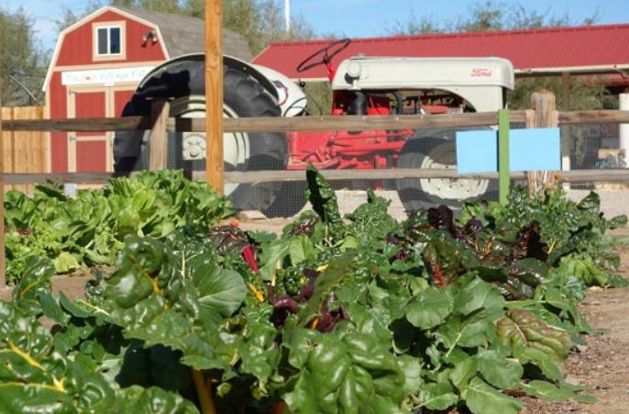Arizona Agriculture Celebrates UA Taking Its Land-Grant Mission South of the Border
Published
2/20/2015
By UA Office of Global Initiatives with contributions by Julie Murphree, Arizona Farm Bureau: Recently, nearly 60 representatives from 19 Mexican universities made a visit to the Tucson Village Farm, located

Tucson Village Farm
The UA is leading the innovative initiative in partnership with New Mexico State University. Called the Red De Extensión e Innovación Nacional Universitaria, or Project REINU, the project will serve Mexico as a national university-based network of scientists and educators to provide resources and educational services across the country. The network will serve as a link between research-based information and communities, as well as youth-based programs similar to Arizona's 4-H Youth Development program.
"
There are currently six primary universities in Mexico involved. Each university has satellite offices, totaling 19 extension sites in Mexico. Proctor said the goal is to involve 80 universities in Project
Paul Gutierrez, an extension specialist for New Mexico State University, said partnering with the UA on project
"The partnership with the University of Arizona was very easy," Gutierrez said. "We're all part of the same cultural fabric."
In the U.S., 4-H is the nation's largest youth development organization and is the primary youth development program of the Cooperative Extension system of land-grant universities across the country. The UA, Arizona's only land-grant university, leads Arizona's 4-H Youth Development program.
The goal of 4-H programs is to prepare young people to make a positive impact in their communities and the world. The program has more than 6 million members nationwide and offers clubs,
Kirk Astroth is director of the Arizona 4-H Youth Development program, operated within the UA College of Agriculture and Life Sciences' Cooperative Extension.
"In countries like Mexico where
During the Tucson Village Farm training, which was just one portion of the visitors' weeklong agenda, attendees were able to tour the farm and learn about various aspects of its operations, such as funding and community program development.
There were also more than 100 first-, second- and third-graders from Coronado and Khalsa Montessori schools visiting the farm during the training, allowing the Mexican representatives to see Tucson Village Farm and Cooperative Extension agents in action.
These kind of collaborative partnerships with Mexico are an encouraging endeavor that many of Arizona’s farmers and ranchers are cheering on. In a recent interview with one of Arizona Farm Bureau’s long-time members, Maricopa County farmer and rancher John Augustine stressed the importance of Arizona and Mexico partnering on
“We have to get our relationship with Mexico squared away,” says Augustine who has a wholesale plant nursery,
Augustine went on to discuss the analogy that a rising tide lifts all boats. Everybody wins when we mutually seek to improve partnering economies. He’s hopeful that efforts such as the UA can further the cause.
Augustine, the
Astroth has former experience building 4-H programs in other countries. He has coordinated programs in Latvia and Lithuania and most recently returned from Nepal, where he also helped formalize a 4-H program. The best practices he has learned from those experiences will help direct Project
He said 4-H programs have tremendous benefits for nations worldwide because they help to develop a country's youth and its future.
"4-H helps those young people develop the leadership skills and practical life skills so that they can have input and influence on the future,